
Ranunculus is a large genus of about 1700 to more than 1800 species of flowering plants in the family Ranunculaceae. Members of the genus are known as buttercups, spearworts and water crowfoots.
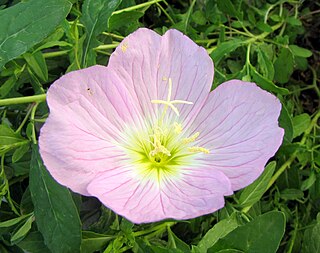
Oenothera speciosa is a species in the evening primrose family known by several common names, including pinkladies, pink evening primrose, showy evening primrose, Mexican primrose, and buttercups.

Rubus hispidus, with the common names swamp dewberry, bristly dewberry, bristly groundberry, groundberry, hispid swamp blackberry or running swamp blackberry, is North American species of dewberry in the rose family.

Ranunculus acris is a species of flowering plant in the family Ranunculaceae, and is one of the more common buttercups across Europe and temperate Eurasia. Common names include meadow buttercup, tall buttercup, common buttercup and giant buttercup.

Campanula cervicaria, the bristly bellflower, is a species of flowering plant in the bellflower family Campanulaceae. The plant is roughly hairy and the flowers are about 1–2 centimetres (0.4–0.8 in) long, light blue and are grouped together.

Kumlienia hystricula is a species of flowering plant in the buttercup family known by the common name waterfall false buttercup.
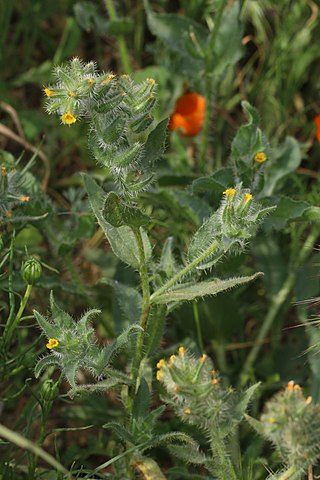
Amsinckia tessellata is a species of fiddleneck known by the common names bristly fiddleneck, tessellate fiddleneck, checker fiddleneck, and devil's lettuce.

Anoda cristata is a species of flowering plant in the mallow family known by many common names, including spurred anoda, crested anoda, and violettas. It is native to North and South America. It is known throughout the rest of the Americas as well as Australia as an introduced species and often a noxious weed. It has been found as a weed in Belgium. Naturally, it is often found near streams, in moist meadows, and in disturbed areas.
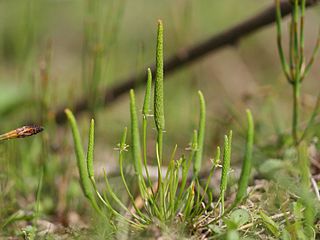
Myosurus minimus is a species of flowering plant in the buttercup family known by the common name tiny mousetail or just mousetail. It is native to much of the Northern Hemisphere, including parts of Europe, Asia, North Africa, and North America. It generally grows in moist habitat types, such as riverbanks and wet meadows.

Ranunculus eschscholtzii is a species of buttercup flower known by the common name Eschscholtz's buttercup.

Ranunculus muricatus is a species of buttercup known by the common names rough-fruited buttercup and spinyfruit buttercup. It is native to Europe, but it can be found in many other places in the world, including parts of Africa, Australia, and the western and eastern United States, as an introduced species and agricultural and roadside weed. It grows in wet habitats, such as irrigation ditches. It is an annual or sometimes biennial herb producing a mostly hairless stem up to half a meter long which may grow erect or decumbent along the ground. The leaves have blades a few centimetres in length which are deeply divided into three lobes or split into three leaflets. They are hairless to hairy in texture, and are borne at the tips of long petioles. The flower has five shiny yellow petals under 1 centimetre (0.4 in) long around a lobed central receptacle studded with many stamens and pistils. The fruit is a spiny achene borne in a spherical cluster of 10 to 20.

Ranunculus auricomus, known as goldilocks buttercup or Greenland buttercup, is a perennial species of buttercup native to Eurasia. It is a calcicole typically found in moist woods and at the margins of woods. It is apomictic, and several hundred agamospecies have been recognised.
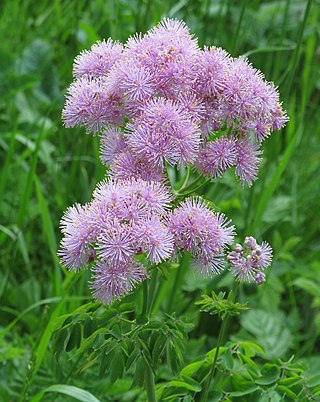
Thalictrum aquilegiifolium is a species of flowering plant in the buttercup family Ranunculaceae. It is known by the common names Siberian columbine meadow-rue, columbine meadow-rue, French meadow-rue, and greater meadow-rue. Its native range extends through Europe and temperate Asia, with a naturalized distribution in North America limited to New York and Ontario.
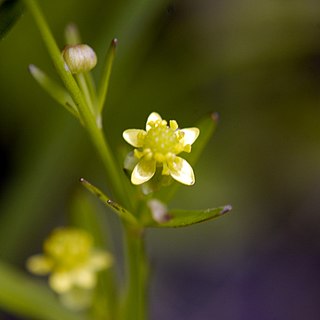
Ranunculus abortivus is a species of flowering plant in the buttercup family, Ranunculaceae. Its common names include littleleaf buttercup, small-flower crowfoot, small-flowered buttercup, and kidneyleaf buttercup. It is widespread across much of North America, found in all ten Canadian provinces as well as Yukon and the Northwest Territories, and most of the United States, except Hawaii, Oregon, California, and parts of the Southwest.

Ranunculus micranthus is a flowering plant species in the Ranunculus (buttercup) family known by the common names rock buttercup and small-flowered crowfoot. It is native to North America, with a distribution that covers much of the eastern United States. R. micranthus is very similar in appearance to R. abortivus. The distinguishing characteristics are the hairiness of their receptacles and shininess of their achenes.

Alcea setosa, the bristly hollyhock, is an ornamental plant in the family Malvaceae.

Smilax tamnoides, common name bristly greenbrier, is a North American species of plants native to the United States and Canada. It is widespread from Ontario and New York State south to Texas and Florida.
This is a list of plants documented to have been traditionally used by the Cherokee, and how they are used.

Ranunculus hispidus is a species of perennial flowering plant in the buttercup family, Ranunculaceae. It is commonly known as bristly buttercup or hispid buttercup. It is a small plant native to central and eastern North America that grows to a height up to 30 cm (1 ft) and has 5-petaled yellow flowers.


















